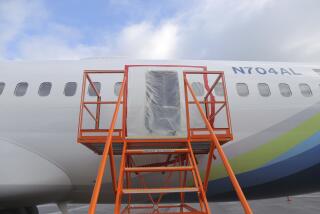Congress Starts Challenger Inquiry on Tougher Note
- Share via
WASHINGTON — Members of Congress launched their investigations of the Challenger accident today with criticism of their own past supervision of the space agency and promises of a tougher stance in the future.
“Congress has been too shy in finding fault with NASA,” said Rep. Robert A. Roe (D-N.J.) of the House Committee on Science and Technology. “As the result of the Challenger accident, Congress and NASA must begin a new era, one in which Congress must apply the same strong oversight to NASA that it does to any other government agency.”
Those remarks set the tone as lawmakers in both the House and Senate began a lengthy series of hearings into the nation’s worst space disaster.
Key witnesses were William P. Rogers and Neil A. Armstrong, chairman and vice chairman of the presidential commission whose report on the accident was released Monday. (Story on Page 11.)
That report blamed the disaster on a faulty joint in the shuttle’s right booster rocket and blamed the National Aeronautics and Space Administration for insufficient safety precautions and bad management.
Rogers said the commission has done its job in pinpointing the cause of the accident and underlining NASA’s deficiencies.
“Now it is up to this committee to be watchful,” he said. “This committee could be very helpful to make sure there is a reinvigoration of NASA.
“This has been a tough time for NASA,” Rogers said. “They have to say, ‘We made a mistake, now let’s get on with it.’ ”
Summing up the commission’s four-month inquiry, Rogers told the House committee: “There’s no doubt about it, serious mistakes were made. . . . We set them all out.”
Congress deferred to the Rogers commission in the investigation, but member after member began the hearings with a pledge to look more critically at NASA, which has enjoyed overwhelming approval from legislators for a quarter of a century.
Some critics have expressed concern about a cozy NASA-Congress relationship that enabled two oversight committee chairmen, Rep. Bill Nelson (D-Fla.) and Sen. Jake Garn (R-Utah) to make shuttle flights.
The commission endorsed a system for crew escape if the shuttle encounters difficulties on landing, but Armstrong, a former astronaut who was the first man to walk on the moon, told the House committee that no escape mechanism the panel considered would have allowed the seven Challenger astronauts to survive the Jan. 28 disaster.
Armstrong said “exotic systems” such as a rocket-propelled escape module “are probably not practical to incorporate into the design at this time.”
More to Read
Sign up for Essential California
The most important California stories and recommendations in your inbox every morning.
You may occasionally receive promotional content from the Los Angeles Times.










